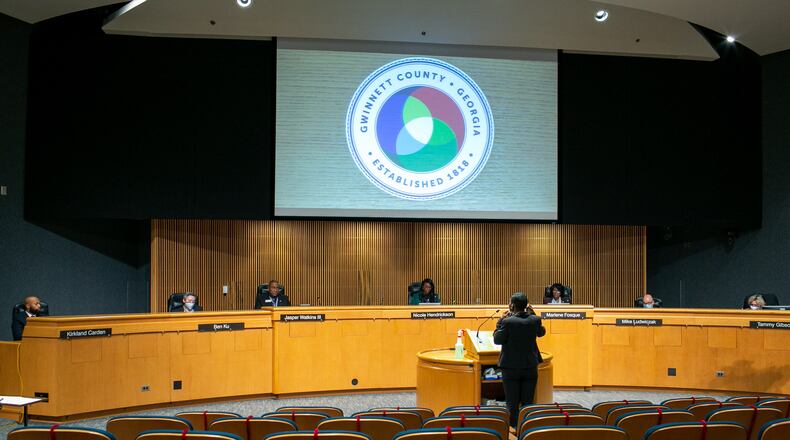Gwinnett County’s new tax commissioner wants to boost her salary by more than $110,000 by increasing the fees she charges cities to collect their taxes.
Gwinnett Tax Commissioner Tiffany Porter, who was elected in November, makes $141,098. But a proposal to charge cities $2 a parcel in additional fees would raise her salary by $110,734, according to Lawrenceville City Manager Chuck Warbington.
The increase would make her the highest paid elected official in Gwinnett County.
“That’s not something we’re interested in,” Warbington said.
The proposal echoes fees imposed by Fulton County Tax Commissioner Arthur Ferdinand, who for years has come under fire for padding his salary with the same charges. In 2019, The Atlanta Journal-Constitution reported Ferdinand made $491,193; his base salary was $161,312. Since then, he inked agreements that would have raised his salary by more than $30,000 additionally.
While such fees are legal, Gwinnett’s previous tax commissioner, Richard Steele, did not impose them. Warbington said he thought they were prohibited locally.
Legislators in the past have tried to tamp down on the fees tax commissioners charge. Former Rep. Wendall Willard said he thought the state had taken action to eliminate the fees when existing contracts with tax commissioners ended. But tax commissioners can simply refuse to collect for cities that don’t agree to the fees they propose.
“It’s a shame. Tax commissioners get an office and they become greedy people,” Willard said. “I wish somebody in the Legislature had the wherewithal to say: ‘We’re going to stop this practice once and for all.’”
Porter, in an emailed statement, said a third of Georgia’s counties use the model she is proposing. She said the cities had been underpaying for the tax collection service, “which requires expensive systems and highly-trained staff.”
“The Gwinnett County tax commissioner is personally liable for the $1.6 billion in operations and the law allows the tax commissioner to receive a fee personally,” she said in the statement.
She also said some of the cities’ contracts were 20 years old, and the tax commissioner’s office had for years absorbed the difference in cost.
The department has run a surplus in recent years.
Porter said she aimed to be transparent, and so asked to meet with each city to explain her reasoning ahead of sending the new contracts.
Several cities reported that a request to have a meeting with all of them, as a group, was rejected. Some county commissioners also said they were not able to meet with Porter, despite asking to do so.
Gwinnett County Commissioner Marlene Fosque said if any cities agree to the new terms, county commissioners will have to vote on the agreements, since payments would come through the county.
“If cities agree to that, we would support the cities in whatever choice they make,” Fosque said.
Butch Sanders, the Snellville city manager, said he found Porter’s initial request for a fee increase “troubling and unexpected.” The cost to Snellville would be more than three times what the city currently pays, he said.
Sanders said he believed if Snellville rejected the proposal, Porter would not collect the city’s taxes.
“We’re still very concerned about the $2 personal charge being requested by the tax commissioner,” he said.
Porter’s office collects taxes for eight Gwinnett County cities: Berkeley Lake, Dacula, Grayson, Lawrenceville, Lilburn, Peachtree Corners, Snellville and Sugar Hill. Representatives from other cities declined to comment or did not respond to phone or email messages seeking comment.
According to a letter, presentation and contract sent to Lawrenceville Mayor David Still from Chief Deputy Tax Commissioner Denise Mitchell, Porter would receive “an annual one-time supplemental payment equal to two dollars ($2.00) per parcel billed for the City” for her work.
The letter laid out a page-long list of services the office provided, from applying homestead exemptions and generating tax bills to answering calls from tax payers. Mitchell said in the letter that she “wanted to remind you of the full list of services because sometimes people erroneously assume that it’s ‘just pressing a button’ or ‘a one-time add,’ but this is not anywhere close to the actual work involved.”
“As you can see from the list, a tremendous amount of highly trained staff, professional services, and technology come into play in order for us to collect on your behalf,” she wrote.
The letter gave the city an April 8 deadline to sign a new contract. Previous contracts, with Steele, ended at the end of 2020.
Last year, Lawrenceville paid $15,385 to the tax commissioner’s office, according to Porter’s presentation, a cost of $1.37 per parcel. Under her new proposal, in addition to the $2 per parcel fee, Porter proposed charging $1.80 per parcel for billing and collection.
That would cost Lawrenceville more than $42,500.
The presentation compares the proposed cost to what Lawrenceville would spend if it was a Fulton County city: More than $55,000.
Bob Ellis, a Fulton County commissioner who has been critical of the fees Ferdinand charges, said he wished the practice could be stopped. He questioned whether Porter had told voters of her plans before being elected.
“Voters and citizens need to be made aware of what’s going on,” he said.
Kirkland Carden, a Gwinnett County commissioner, said Porter’s request for the fees “sends a terrible message” as residents are continuing to struggle with the effects of the coronavirus pandemic. Porter beat Carden’s mother, Regina Carden, in the Democratic primary.
“She’s choosing to do this at a time when so many Gwinnettians are hurting,” Carden said. “It is legal, but is it the right thing to do at this time?”
About the Author
The Latest
Featured


